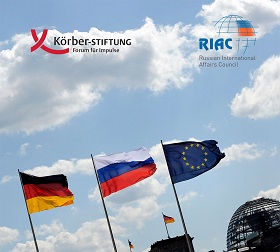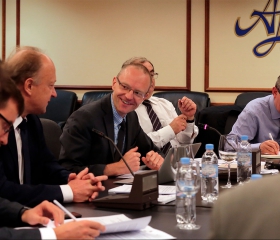Russia and the European Union have traveled a long road in their relations, from the euphoria and anticipation in 1994, when an Agreement on Partnership and Cooperation was signed, to nearly a collapse of relations today. What is vital now is to recognize the “new normal” and come up with principles for future dialogue.
Russia and the European Union have traveled a long road in their relations, from the euphoria and anticipation in 1994, when an Agreement on Partnership and Cooperation was signed, to nearly a collapse of relations today. The latest development was last week’s extension of EU sanctions on individuals and entities involved in what the EU considers Russia’s illegal annexation of Crimea from Ukraine.
It would not be an exaggeration to say that at the moment, any attempt to reset relations is occurring in a completely different global context. Moscow and Brussels differ fundamentally in their political rhetoric, understanding of current events, views on international law, interpretation of values and strategic thinking.
Jean Monnet, French political economist and diplomat and one of the founding fathers of the EU project, once said that nothing can be started without people, and nothing can be saved without institutions. In the summer of 2016 the Russian International Affairs Council (RIAC) and the German Council on Foreign Relations (DGAP) launched a joint project that aims to examine the key features of Russia-EU relations.
The goal of this joint project is to assess which mechanisms, institutions and formats of cooperation were most and least productive and, following from this, come up with suggestions for developing further dialogue between the states. On Sept. 12th, the first-ever expert dialogue took place within this initiative.
In 2003, the main course of Russia-EU relations was set at the formation of a free trade zone, an open integrated market between Russia and the EU based on common rules and regulations. Cooperation in this format meant bringing countries’ regulation systems to one common standard. This concept was developed further in 2005, when a “roadmap” was created for the further development of EU-Russian trade relations.
In the period of cooperation between Russia and the EU in the “roadmap” phase there was a clear understanding on both sides that this cooperation would lead to the emergence of four freedoms – the free movement of goods, services, capital and labor.
According to both EU and Russian experts, the EU never took serious steps to implement this plan. However, special relations had formed under the terms of “four spaces” between Russia and the EU and NATO-Russia Council. Yet, cooperation on this level was not enough to prevent the crisis in which Russia and the EU have found themselves today.
Relations between Moscow and Brussels since the beginning of the Ukraine conflict leave much to be desired. It is clear that a return to “business as usual” dialogue is quite unlikely. What is vital now is to come up with a “new normal” principle for further dialogue, though it’s yet unknown on what basis it might be based on.
The main difficulty today is that neither side has a coherent understanding of its own political goals. This, in turn, leads to misunderstanding of the goals for mutually beneficial cooperation.
Experts in Russia have more than once suggested shifting the discussion to the level of cooperation between the EU and the Eurasian Economic Union (EEU). But this proposal requires further development.
The first step towards such collaboration could start with the beginning of official dialogue between the European Commission and the Eurasian Economic Commission and a formulation of a list of topics that are of interest to both groups. The signing of official documents would constitute another step. According to Russian experts, signing a trade agreement with the EEU would be beneficial for the European Union as it would give EU producers access to a new important export market.
However, many European experts find the idea of the Eurasian Economic Union itself quite doubtful. They have questions about the economic interests and integration goals of this project. Many experts see the Eurasian Economic Union as simply an attempt to recreate the Soviet Union.
At the political level, the rhetoric seems to be softer. However, despite the fact that in the EU Global Strategy, the Union promises to support regional integration process and expresses its readiness to cooperate with regional integration projects, the EEU is not listed among such projects.
At the St. Petersburg International Economic Forum in June 2016, a proposal was made to create a great Eurasian partnership with China’s participation. It was also emphasized that such a project would also be open to the EU, as a key trading partner for Russia. For now, such an idea of an EU-Russia-China partnership provokes more questions than answers, mostly because the participation of China would completely shift the balance of power in the group.
The five principles for future Russia-EU cooperation formulated by Federica Mogherini, the current high representative of the European Union for Foreign Affairs and Security Policy, indicate that one can only expect progress to occur on issues where the interests of Moscow and Brussels coincide.
Such statements and documents do not shed light on the goals of cooperation, but rather, create certain frameworks for further dialogue. What is supposed to fill these frameworks remains unclear and completely depends on the actions of policymakers, diplomats and experts.
Russia and the EU will have to agree on a common vision and goals for their relations. Dialogue on a political level, together with an understanding of common objectives for cooperation, are the most important conditions for forming institutions and mechanisms that could guarantee the achievement of these goals.
One thing is clear: cooperation is the most rational course of action for Russia and the EU. Common action may be necessary even on questions where the EU and Russia disagree, as that can give an impulse to improvement in the future. Under the current political atmosphere, many ideas and proposals currently seem unrealistic. But after some time passes, the situation may change, and it makes sense to establish a plan of action for the future now.
First published in Russia Direct







